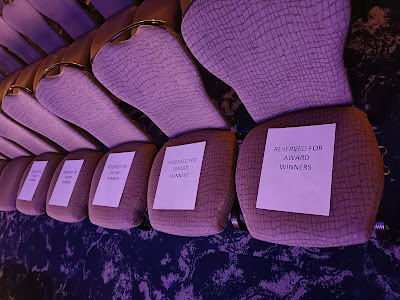So, this was supposed to be one of those new year retrospectives. It's just that I didn't really find time to write this until now. Still closer to last new year than the next one, so I think it's ok. As usual, this is a round-up of all free and open source silicon, or FOSSi, things I have been involved in over the past year.
FOSSi Foundation
 |
| Beatiful evening in Santa Barbara. What is not seen in the picture is that everyone spent the rest of the evening trying to get rid of tar from their feet |
This was the year when we resumed our on-site conferences after doing our virtual FOSSi Dial-Up series for a few years. We did Latch-Up in Santa Barbara and ORconf in Munich, and both events were great successes. Hope to see you all at our future events. Fellow FOSSi Foundation director Philipp Wagner also did a well-received open source chip design talk at the FOSDEM main track.
SERV
The award-winning SERV, the world's smallest RISC-V CPU turned five years old, which I wrote about in a retrospective called Five years of SERVing for its fifth birthday. It was also the year when SERV got its big sister, QERV, which provides a 3x speed-up for a marginal extra cost in area. Most of the work was done by a colleague at Qamcom and we did a press release called Qamcom boosts RISC-V which has more details. QERV currently lives in a separate repository, but the ultimate goal is to integrate it into SERV with a switch to select width.There's also an ever bigger version called HERV on its way. A lot more things has happened with SERV but I'm saving that for the next SERV release announcement. Some of the news were also revealed in the talks I did about SERV at FPL (not recorded), ORConf and the Göteborg RISC-V Meetup (not recorded).
FuseSoC
 |
| A tour through FuseSoC and Edalize |
FuseSoC saw a lot of activity in 2023. We finally got version 2.0 out of the door and with that we could remove a lot of old code and focus on new features such as core file validation, supporting the use of FuseSoC as a library instead of a stand-alone application, cached generators, file tags, minimizing rebuilding and other things that you can read about in the FuseSoC documentation. I also managed to three FuseSoC presentations; at FPL (not recorded), ORConf and the CHIPS Alliance Technology Update.
VeeRWolf
Edalize
Speaking of backends, Edalize got several new ones in 2023, namely sandpiper-saas, openroad, design compiler, genus and efinity
Also the documentation saw a lot of improvements.
CoreScore
LED to Believe
I tried to push for project LED to Believe to support 100 different FPGA boards by the end of the year. We got reeeeally close, but the big celebration came after the year had ended. Still there was a healthy number of newly supported boards over the year.
Other
In an attempt to collect all videos of my FOSSi projects, I made a video gallery. After that experience I decided not to add web design to my CV.
As I have started using Cocotb more and more, I thought it would be a good idea to also have a quick example of how to use FuseSoC and Cocotb together, so I made an example design called fusesocotb to serve as a reference design.
This very blog also celebrated since 2023 was the year that saw the 100000th visitor to the site, much thanks to a UVM vs Cocotb post that went viral in late 2022.
And that pretty much sums up my 2023 FOSSi activities. Well, not quite. I won an award also. At the RISC-V Summit I was awarded a Community Contributor award. I was really happy to receive that and to hear that the open source contributions I do are actually acknowledged and appreciated. So, big thanks for that. And thanks also to the RISC-V summit organizers for making it easy to find my seat.





No comments:
Post a Comment